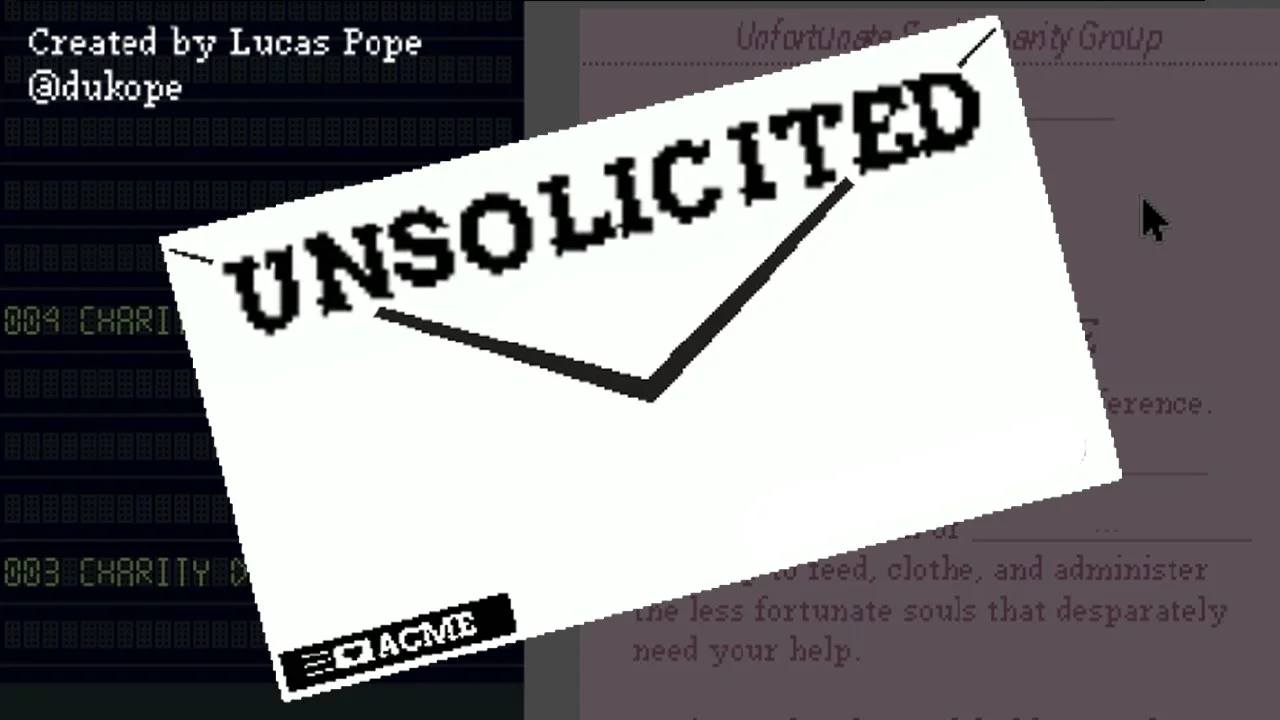Unsolicited
Have you ever wondered how special offers arrive in the mailbox with your name on it as if they’re just for you? It’s tailored for each person, although usually nothing anyone would ever want. It’s like a commercial on paper, one that your mailbox cannot refuse. Sorting through piles of junk, one might ask, “How’d I get on these mailing lists?” The game, Unsolicited, created in 2015 by Lucas Pope, is based on the idea that “you are the monster” who manufactures the junk mail behind the scenes. It’s a job, right?
“Part of me is desperate to get all of those letters correctly filled out and sent each shift – just one more bit of junk mail! – and part of me hates that I’m even doing this in a game.”
Congratulations! You’ve just been hired to tailor junk mail to people based on lists of information provided by clients. The responsibilities are to tediously sort through recipients’ information to apply onto letters, which you must then sign, seal and deliver. The simplistic retro style graphics and Atari-like music are reminiscent of early computer games and a great touch for the monotony of the tasks. You start with your first client, a charity, and must examine lists of information and select the correct material on the form for the person you’re mailing the letter to. As you’re figuring out what’s expected of you, you might get fired in the process for being too slow or making too many mistakes and must start over. It becomes increasingly confusing as you’re given more clients, time-share offers, credit cards, and debt collections. As a result, the forms must be completed in shorter amounts of time; productivity dominates performance as the timer ticks away. At the end of each segment, you receive a message of feedback from your boss. Sometimes there’s a choice of responses to return to the boss, and sometimes there’s only one option.
Soon enough, you’re drowning with incoming clients, and you may start to lose customers for being too slow. You’re in the game of producing as much as possible as efficiently as possible.
Image courtesy of https://www.pcgamesn.com/unsolicited-is-papers-please-developer-lucas-popes-latest-game-its-about-sending-mail
As you’re drowning in data and thinking you’ll probably get fired, your boss tells you that a paper ration has been ordered by the military and you have no more clients. You can choose to quit or to hang on and “clean your desk,” hoping things will get better. Time passes. With a cleaner desk, you’re eventually told you have a new client, the military, and you’re assigned to send notification letters to families of soldiers killed in action. You see the cause of death, but this is not included in the letter you’re sending to the family. As you fill out these letters, you begin to realize that very few of these soldiers actually die from enemy combat. In fact, most die from starvation, illness, friendly fire or suicide. The death toll pours in; remember your productivity!
“Unsolicited crushes your soul beneath much more recognizable evils.”
This game captures the essence of unsolicited mail from the perspective of the employees who produce this mail. On the one hand, there’s the desire to keep one’s job by being rewarded for productivity and accuracy. It becomes a monotonous, repetitive task to complete more and more letters, but it’s not your job to think about the implications or affects of these letters. No need to wonder why one recipient will receive an 8% interest rate with a .25% return, while another is offered a 5% interest rate with a 1% return. Nor should you question where the data came from when requesting that someone pay $300 to charity, but asking another for $25. You shouldn’t wonder if this sweepstakes ends up costing an elderly person their pension, or any other financial or environmental effects these letters inevitably have. You really just need to focus on your numbers, your accuracy, and complete your tasks. This becomes increasingly difficult as one’s humanity is confronted more and more throughout the game. At some point, losing the job is inevitable.
(https://www.forbes.com/sites/zachbudgor/2015/08/27/play-this-send-the-most-soul-crushing-mail-of-your-life-in-unsolicited/#670fefcc3809). One might be wondering why continuing to try feels so compelling. How much is it worth to keep the job for a little while longer?
“His fascination with the complexity of drudgery is an indicator of great empathy: his games understand that being ground beneath a heel, whether it’s dystopian or capitalist, is uniquely painful.”
Unsolicited poignantly creates an opportunity to reflect on the effects of junk mail that confusingly feels fun, ironic and incredibly disturbing. The game raises questions about the insidious nature of junk mail corporations and how they’re obtaining personal information about people to make a profit. Unsolicited reveals concerns about a capitalistic society that thrives on selling people things that they don’t need or even want. At the same time, empathy is felt for the monster that we have to become as a part of the game. From this perspective, we can see how easy it is to become removed from the effects of our actions even if those actions could lead to damaging outcomes.
Image courtesy of https://www.wired.com/2011/09/phone-story/
Paolo Pedercini’s game, Phone Story, is also an interactive experience consisting of four games that raise social awareness and empathy toward situations happening behind the veil of public view. In Phone Story, players must force enslaved children to mine for Coltan, a metal used in electronics, such as the IPhone. In another game, players prevent suicides with nets at a Foxconn Factory, an IPhone manufacturing site, (Wikipedia). In a similar methodology to Unsolicited, You are the Monster, Phone Story puts the player in a role of responsibility by participating in a situation that has harmful consequences. Playing Phone Story with one’s iPhone poignantly reveals our roles as consumers in the perils of iPhone manufacturing, reflecting the power of our choices in participation of these human rights offenses. Similar to Unsolicited, the player’s role is relatively unsuspecting as the consequences of one’s actions are further revealed. Both games reveal a perspective of a system that we participate in, but normally don’t see. A key difference between these games is the content message, Phone story raises awareness of thoughtless consumerism and Unsolicited responds to the insidious nature of junk mail corporations.
Image courtesy of https://papers-please.en.softonic.com/mac
In Lucas Pope’s 2013 game, titled, Papers, Please, a Dystopian Document Thriller, the player is a document inspector for the communist state of Arstotzkan, who has recently overtaken the neighboring territory of Grestin. As inspector, your morality is constantly confronted as you decide who can cross the border and who will be sent back or arrested based on their documents. The player must decide which immigrants are looking for work while protecting the state from spies and terrorists. Similar to Unsolicited, Papers, Please evokes the pressures of keeping a job with an increasing conflict of one’s morality. One’s ethical boundaries become eroded with the choices of doing a job well. In Papers, Please, however, the player directly deals with the people that are affected by these choices, as opposed to the faceless names in Unsolicited. Both games create an opportunity to play out these choices and find a morally bereft low, while still managing to understand that people are sometimes in desperate need of a job.
The game, Unsolicited, reflects the conflicting messages of doing a job well and the voice of one’s conscience create an upsetting and complex situation. There’s seemingly so little time to stop and think. It starts out relatively harmless, but at what point do these practices become predatory? There’s a slippery slope between asking for charity donations to withholding the questionable cause of death from soldier’s families. A situation can get out of control so quickly when productivity and performance become isolated from the real impact on humanity. It’s eerily revealing to witness the quiet ways fascism can creep into society.
References:
Game link: http://dukope.com/play.php?g=uns
https://www.rockpapershotgun.com/2015/08/28/unsolicited-lucas-pope/#more-310841








